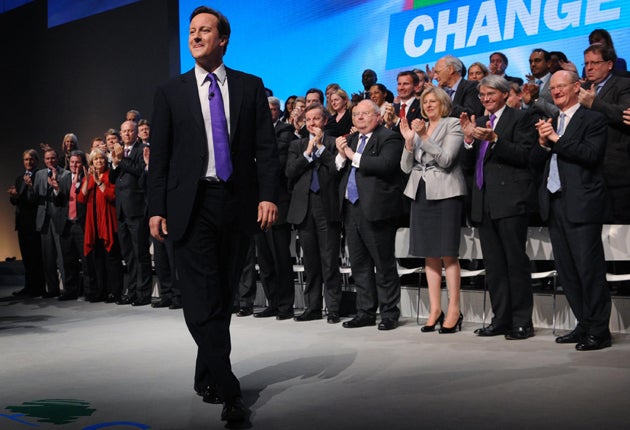Andrew Grice: Complacency was the Tory problem last year. Not now
Inside Politics

Six months ago, Lord Mandelson told the Cabinet that Labour faced an "uphill struggle" and the general election looked "very difficult". This week, the Business Secretary, who is in charge of Labour's election strategy, told his fellow ministers: "We have moved to a different place. It is game on."
Cabinet ministers are pleasantly surprised by the Conservative Party's dip in the opinion polls and relieved that Labour does not appear to have been damaged by the "Bullygate" allegations that Gordon Brown mistreated Downing Street staff. So far. The damage may yet come, since the phrase that will stick will be Alistair Darling's astonishing remark on Sky News that the "forces of hell" were unleashed upon him by Brown allies in 2008 when he predicted that Britain faced "arguably the worst" economic crisis for 60 years. It was a slip, not a premeditated attack. A Freudian one, though. "Sometimes what is going on in your head comes out of your mouth," one ally of the Chancellor explained.
Perhaps the voters would like that to happen more often. Labour's surprise that the Tories' double-digit poll lead has fallen to six or seven points is matched at Conservative Campaign Headquarters.
It would be wrong to say the Tories are in a panic about headlines suggesting that we are heading for a hung parliament. They are confident that, with the help of Lord Ashcroft's millions, they will outgun Labour and the Liberal Democrats in the marginal seats that will decide the election. But of course they are worried about the polls. It wasn't supposed to be like this. The Tory battle-plan was to maintain a solid 10-point lead, then extend it by "hitting the ground running" at the start of this year. Before Christmas, David Cameron was telling his inner circle that January would be a crucial month. Well, it was, but not in the way he planned.
The Tories have made a series of mistakes. Mr Cameron "messed up" on their policy to reward marriage in the tax system; the Opposition got in a tangle over its figures on crime and teenage pregnancies and, more importantly, sent conflicting signals over when it would start to make significant cuts in public spending, after being spooked by the feeble 0.1 per cent growth figure for the past three months of 2009 (revised yesterday to 0.3 per cent). After appearing to back away from big cuts this year, the Tories have reverted to their austerity message of last autumn. "Real cuts, not token cuts, but not swingeing cuts," George Osborne explained this week.
Lord Mandelson has called Mr Cameron "Mr Wibbly Wobbly" in an attempt to undermine his credentials as a strong leader. Mr Brown might not be loved, and his personal ratings trail his party's (unlike Mr Cameron's, who is liked more than his party, a different problem). But at least the Prime Minister is tough and "strong for Britain" in a crisis, Labour will argue. Voters may forgive Mr Cameron's inexperience if he looks decisive, but not if they think he can't make his mind up about the central issue facing the country.
Tory strategists insist the party's policy on cuts never changed but they acknowledge they could have explained it more properly in media interviews. They believe the polls reflect a cumulative effect from unforced errors and admit privately that there has been a lack of clarity about the party's policies.
MPs, candidates and the party's grassroots are jittery. "We can't go on like this," said Tim Montgomerie, editor of the influential Conservative Home website, turning the Tories' anti-Labour slogan back on to the party's high command. "We have lost support in recent weeks and we can't afford to lose much more."
Mr Cameron will try to get the Tories back on track tomorrow in an important speech to the party's spring conference in Brighton. Again, it will be a different script to the one he envisaged before Christmas. He doesn't have to ban complacency and champagne; the polls have done that for him. The Tories know they have a real fight on their hands.
The Tory leader will go back to what he does best, speaking without notes, as he famously did to win the party leadership against the odds at its 2005 annual conference. He will dismiss the idea that the Tories are trying to coast to victory on a "reassurance" strategy and insist the election will be all about "change", and radical change, too. The Tories will use the conference to display "the meat behind the message", highlighting six key pledges: to cut debt; boost enterprise; make Britain the most family-friendly country in Europe; support the NHS; raise standards in schools and reform politics.
Mr Cameron is determined to stop Labour making the election a referendum on the Tories (and thus prevent it being a referendum on 13 years of Labour rule).
After grumbling in Tory ranks that the party has not been strong enough in its attacks on Labour, he will play what he believes may prove his trump card, asking the voters why they would want "another five years of Gordon Brown". It is a line we will hear ad nauseam from now on. And it is a question Labour has not yet answered.

Join our commenting forum
Join thought-provoking conversations, follow other Independent readers and see their replies